- Home
- Leslie Meier
Bake Sale Murder Page 13
Bake Sale Murder Read online
Page 13
Lucy figured today’s conference would be worse than usual. It was the first since Chief Crowley’s retirement and the new chief, Frank Kirwan, would be eager to strut his stuff. Nevertheless, attendance was necessary, if only to pick up the official press release, and Lucy wasn’t surprised to find a crowd in the basement bomb shelter-turned-crisis management center at the police station. The Boston and Portland media, from TV to radio to newspapers, were well represented. Chief Kirwan would be pleased.
Lucy found a seat in the front and waited impatiently for the dog and pony show to begin, promising herself that she’d get out of there as soon as the press releases were distributed. She hoped that Audrey, the department secretary, had fired up the Xerox machine and was printing them out at this very moment.
But when the procession of officials began filing into the room, led by Chief Kirwan, the secretary and her pile of fresh-from-the-copier press releases were conspicuously absent. There was a collective sigh of resignation from the assembled journalists as they opened their notebooks and switched on the cameras and recorders.
It wasn’t until the official square dance of thank-yous and acknowledgements and hymns to cooperation had ended and the DA was answering questions that the evidence against Fred Stanton was even mentioned, and Lucy found it less than compelling. The fact that Fred’s fingerprints were on the murder weapon was hardly surprising; after all it was his knife, from his house, and he might have used it to cut a ham sandwich. More interesting to Lucy was the mention that a witness reported seeing him leave the house in what the DA described as “an agitated state” on the day of the murder. Lucy had doubts about the value of that information, too. It seemed to her she left the house in an agitated state most mornings due to the fact she was often running late, or the girls were dawdling or the dog had gotten into the trash. There was always something. She raised her hand.
“Yes, there, you in the back,” said the DA, pointing to her.
“I was wondering if you have any information about the body that was found in the harbor this morning? Has the man been identified and was there any foul play?”
There was a flurry of interest from the reporters, but the DA wasn’t giving anything away. “No, we have not made an identification and no, there were no signs that his death was anything but an accidental drowning, but as you know it’s up to the medical examiner to determine the exact cause of death.”
“And when do you expect that report?” asked someone in the front row.
“That also is up to the medical examiner,” said the DA. “Now, I’ll take one more question before closing.”
Lucy was hurrying out of the police station, finally clutching the not-very-informative official press release, when she ran into Barney Culpepper.
“Hi, Barney. How’s Marge coming with the triathlon? And how’s Eddie doing over there in Iraq?”
“Eddie’s counting the days ’til he comes home—and so are we,” he said, looking grim.
“We all are,” said Lucy, who could imagine how worried they must be.
“Marge says I need to get my mind off the war. She wants me to start training with her,” he said, glumly, hitching up his pants. He fastened his belt underneath his sizable belly and it tended to slip. “She’s threatening to get rid of my La-Z-Boy.”
“Oh, no.” Lucy knew how much Barney enjoyed reclining in his favorite chair, watching football and baseball games, even golf if nothing else was on.
“She hid the remote. Said it’s good for me to get up and change the channels on the TV.”
“Well, maybe she has a point,” said Lucy.
“Have you ever tried to switch from channel five to channel sixty-three by pushing that little up button one channel at a time?”
“Can’t say I have,” said Lucy, spotting an opportunity. “Listen, you can watch TV at my house if you do me one itsy bitty little favor.”
“Oh, no. I can’t. The new chief wouldn’t like it.”
“How do you know he won’t like it? I haven’t even told you what it is.”
“C’mon, Lucy. If the chief won’t mind why don’t you ask him, hunh?”
“Because you’re right, he’ll probably mind. But I really want to know if the medical examiner has got a cause of death on that guy they pulled out of the harbor this morning.”
Barney gave his jowls a thoughtful scratch. “It just happens I know somebody who works over there. Luke Martin, remember him? Good little shortstop, maybe a year or two younger than Eddie and Toby.”
“He’s working in the ME’s office?”
“Yeah, flunked out of pre-med.” Barney was already dialing the phone and, after a brief discussion of the Red Sox prospects for the Series, learned that preliminary toxicology tests had revealed a blood alcohol level of 0.19.
“So he was drunk?” asked Lucy.
“Drunk as a skunk,” said Barney.
“Thanks. I owe you big time,” said Lucy, blowing him a kiss and dashing for the door. She was already writing the story in her head as she hurried along the sidewalk to the Pennysaver office, but soon realized that apart from the when and where she didn’t have the least idea as to the who, why, and even the what. The tests seemed to indicate death by misadventure due to drunkenness but Lucy had her doubts. There’d been no sign of booze at the homeless man’s camp, in fact, he was extraordinarily neat and tidy for a drunken bum.
Chapter 13
When Lucy got back from the press conference, Ted had left the office and Phyllis was stuffing subscription renewal notices into envelopes.
“How was the press conference?” she asked.
“About usual. Not very informative.”
Phyllis went on folding and filling the envelopes; she could do it in her sleep. “Have they got much of a case against Fred?”
“Not unless they’ve got more evidence than they gave at the conference,” said Lucy, looking at her with interest. “Why’d you ask?”
“Oh, I don’t know,” she replied with a shrug. “It doesn’t make sense to me. If your wife works for the town and has friends in the police department you’d have to be crazy to kill her, and I don’t think Fred is crazy. He’s very shrewd. And self-interested. He doesn’t do anything unless it benefits him.”
“How come you know so much about him?”
“Last year I collected donations for the Eastern Star’s benefit auction.”
“Did he donate something?”
“Yeah. A closet system. But he insisted that we feature it in our ads for the event, he specified what size print we used for his name, and he insisted on a receipt so he could get a tax deduction.”
“Doesn’t everybody?”
“Well, yeah. All the donors got a receipt as a matter of course. But he demanded his right up front. He couldn’t wait for the treasurer to get around to it, if you know what I mean. He hounded the poor woman to distraction over it when her husband was in the hospital for a quadruple bypass.”
“I guess you’d say he’s a stickler for details?”
“Oh, yeah.”
“Not somebody who’d impulsively stick a kitchen knife in his wife’s back?”
“No. Definitely not.” Phyllis considered. “He might hire a contract killer—but he’d want a receipt for his taxes!”
Lucy chuckled. “Maybe you could be a character witness for him.”
“Not likely.” She gathered the envelopes together and gave them a sharp smack against her desk, creating a neat pile. “Did they say anything about the homeless guy? I keep wondering what brought him to Tinker’s Cove, anyway? I mean, it’s not like there’s a food kitchen or a shelter, is there?”
“He was at the funeral. That’s where I first saw him, anyway. I guess he must have some connection to Mimi.” Lucy shrugged. “Fred said she didn’t have family so maybe he was an old boyfriend or something.”
“Maybe he was just a crazy guy who liked funerals.” Phyllis was applying polish topcoat with all the care of Michelangelo painting th
e ceiling of the Sistine Chapel.
“Nobody goes to funerals for fun,” said Lucy, coming to a decision. “I’m going to call Fred’s lawyer and see if Fred’s ready for a visitor.”
“He wouldn’t talk to you before,” said Phyllis, waving her hand back and forth as if conducting the Boston Symphony.
“That was before he went to jail,” said Lucy. “Maybe he’s lonesome.”
Phyllis wasn’t convinced and neither was Fred’s lawyer. “The last thing I want him to do is talk to the press,” said Will Esterhaus, speaking from his Portland office.
“But this is different,” said Lucy. “I’m from the local paper, and there’s a lot of sympathy for him here in Tinker’s Cove.”
“I think not,” said Esterhaus. “He is charged with killing his wife, after all. I doubt there’s a great deal of sympathy for him.”
“Small towns have big hearts,” said Lucy.
Across the room, Phyllis rolled her eyes as she unscrewed the top of a bottle of correction fluid.
Now it was Lucy’s turn to roll her eyes as she thanked the attorney for his time which, she thought sourly, was all she got from him.
“You could start the listings,” said Phyllis, dabbing the white fluid onto her checkbook register.
Lucy was too restless to start that job, just the thought of spending the afternoon at the computer made her legs twitch. “Not today,” she said, grabbing her bag. “If the mountain won’t come to Mohammed, Mohammed will have to go to the mountain.”
“What’s that supposed to mean?” yelled Phyllis, raising her voice to be heard over the jangling bell on the front door.
Not quite sure where to begin, Lucy drifted down Main Street toward the harbor. She intended to ask anyone she might see there if they had observed the homeless man but at eleven o’clock on Monday morning the sidewalk was practically deserted. The summer people had all gone home, the kids were back in school, and the only people peering into the shop windows seemed to be shoulder-season tourists.
She intended to talk to the fishermen at the harbor who had discovered the body but as soon as she turned the corner onto Sea Street and saw the smooth blue water of the cove, flat as a pancake, she realized her mistake. The entire fleet would be out today, taking advantage of the calm weather. Discouraged, she decided on Plan B and went back to the Pennysaver to get her car. There was no harm in seeing if Preston and Tommy had changed their minds and were ready to talk to a friendly neighbor.
“I already told you,” said Preston, pausing to let the lawnmower idle while he mopped his sweaty forehead with the back of his hand, “we don’t want to talk to nobody.”
“How’s Tommy doing?” asked Lucy, undeterred.
“He’s fine. Okay? So just leave us alone.”
“I’ve been wondering about that homeless guy,” continued Lucy, squinting in the bright sun. “Do you have any idea why he attended your mother’s funeral?”
“I don’t know what you’re talking about,” said Preston, losing patience. “And if you don’t stop bothering me, I’m going to call the cops.”
“I was only trying to help,” said Lucy, beating a hasty retreat.
“Busybody,” muttered Preston, giving the mower a push.
Lucy was climbing back into her car, intending to go home and make herself some lunch, when she spotted Frankie coming down the drive towards her mailbox. Frankie, she remembered, was rumored to have been having an affair with Fred Stanton. At least that’s what Chris seemed to think. Lucy gave her a wave and hurried down the street to meet her at the box, which had been embellished with paint and a carved wooden head and tail to look like a mermaid.
“I’ve been meaning to ask you,” began Lucy, seizing on the unusual mailbox as a pretext for a conversation. “This is so adorable. Where did you get it?”
“It is cute, isn’t it?” said Frankie, giving her a big smile as she extracted a pile of letters and a Delia’s catalog. “But I don’t know where it came from. It was a housewarming gift from an old friend. I can ask her where she got it, if you want.”
“Would you? That would be great,” said Lucy enthusiastically. “I wouldn’t want to copy you but maybe they have other styles. Like whales. Or maybe I could get one like my dog. Labs are pretty popular and they put them on a lot of stuff.”
“You know, ever since Mimi was, well, you know, I’ve been thinking of getting a dog.”
“You have?”
“Yeah. For security. But I never had a dog,” said Frankie. “Say, have you had lunch?”
“Uh, no,” said Lucy.
“Well, I was just going to make myself a salad. Why don’t you join me and tell me all about Labs.”
“Okay,” said Lucy. “I’d love lunch, but I don’t think you want a Lab for protection. They love everybody.”
“That’s the trick, isn’t it,” said Frankie, as they walked up the drive. “I want a dog that’s a good pet, but one that will let me know if an intruder’s coming. One that barks at the right time, if you know what I mean.”
“We all want that dog,” said Lucy, following her through the door and into her kitchen. “Tell me if you find it.”
Lucy hadn’t really given the matter much thought, but she hadn’t expected Frankie’s house to look the way it did. Since Frankie was a single mom with a teenage daughter, she was prepared for a somewhat casual, messy approach to home décor, probably featuring cheerleading pom-poms and a generous scattering of shoes and other teen detritus. Something like her own house, where antiques and flea market finds were haphazardly mixed with family hand-me-downs and a few upholstered pieces purchased from a discount furniture store.
Frankie’s kitchen couldn’t be more different from Lucy’s if it were on the moon. Pristine white enamel cabinets gleamed beneath an uncluttered granite countertop which featured a colorful porcelain rooster. A round white table stood on the terra cotta tile floor and, instead of a week’s worth of mail and newspapers, the only thing it held was a Quimper tureen. The matching chairs were also bare of anything except charming yellow and blue Provençal print cushions.
“This is really nice,” said Lucy. “It looks like a house in a magazine.”
“Thanks,” said Frankie. “I guess because I’m in real estate I know the importance of interior decoration.”
“I could certainly learn a thing or two from you,” said Lucy, studying the great room that extended beyond the kitchen island. There a couple of over-stuffed white love seats with colorful flowered accent pillows were set at right angles around a low coffee table holding a neat stack of magazines and a fresh flower arrangement. A coordinating entertainment center probably held the TV and DVD player, but its louvered doors were discreetly closed. Lucy sighed, thinking of her family room, where the huge TV held center stage because Bill didn’t want to have to fuss with a lot of doors and things when he collapsed into his battered corduroy recliner to watch Monday night football.
“Are you planning to redecorate?” asked Frankie, who was busy slicing and chopping an assortment of vegetables and arranging them on two plates.
“Not anytime soon,” said Lucy. “We’ve got one daughter in college and two more coming.”
“Maybe you should consider taking a real estate course,” said Frankie. “I’m sure you’d do quite well, certainly better than at the paper.”
“Most anything would pay more than the paper,” admitted Lucy. “But I love it. I couldn’t give it up.”
“Good for you,” said Frankie, setting the table with blue woven placemats, crystal goblets, and cheery napkins that matched the seat cushions. “How about we celebrate our good fortune with a glass of wine? I’ve got a nice buttery chardonnay.”
“Oh, why not,” said Lucy, throwing caution to the wind. She didn’t usually—make that never—drink wine with lunch but then she usually had peanut butter and jelly. This was a grown-up lunch and she might as well have a grown-up drink.
Frankie took a large bottle out of the refrigerator a
nd filled the goblets right up to the brim before setting the bottle in a marble cooler. Then she brought the plates of salad to the table and gestured for Lucy to sit down. “Bon appetit!”
“This is really lovely,” said Lucy, spearing a piece of goat cheese. “Do you eat like this every day?”
“I try to.” Frankie shrugged. “I’m French, at least my family is, and this is the way I was brought up. Food, mealtimes, were always important to us.”
“No fast food?”
“My mother didn’t know the meaning of the phrase.” Frankie was lifting her glass. “She was all about slow food. Cassoulet that took days to prepare, pork pies, homemade sausage, fruit tarts…” She waved her hand. “I could go on and on.”
“My mother was more the ‘dump a can of Campbell’s cream soup into it and call it a casserole’ kind of cook,” said Lucy.
“The important thing is that she was there for you,” said Frankie, waving her fork for emphasis. “That’s why I went into real estate—so I could be home for Renee. At first I only worked during school hours and, now that I’ve built up my clientele, I pretty much work from home. I’m here when she needs me.”
“I have flexible hours, too,” said Lucy. “For me the problem is getting Sara to tell me what’s on her mind.” Before she quite realized what she was doing, Lucy was pouring out her worries about Sara and the way the football players were harassing the cheerleaders. “The only way we’re going to stop this is if somebody goes public, but I can’t get Sara to tell me what’s really happening and she flat-out refused to let Ted, he’s my editor, interview her for the Pennysaver.”
“You can’t blame her,” said Frankie. “No one wants to be a whistle-blower, especially at her age. She wants to be popular.” She nodded knowingly. “These girls will do anything to be popular.”

 Christmas Card Murder
Christmas Card Murder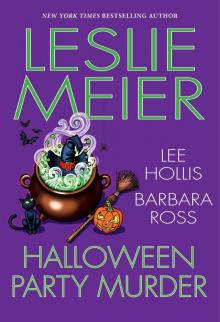 Halloween Party Murder
Halloween Party Murder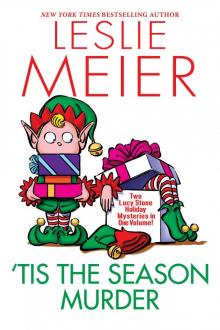 'Tis the Season Murder
'Tis the Season Murder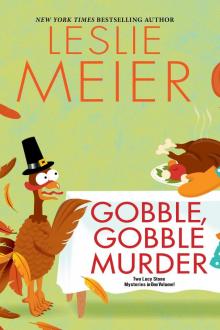 Gobble, Gobble Murder
Gobble, Gobble Murder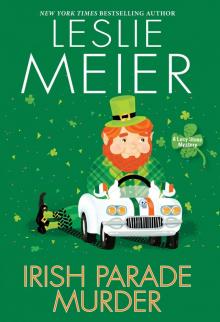 Irish Parade Murder
Irish Parade Murder Bake Sale Murder
Bake Sale Murder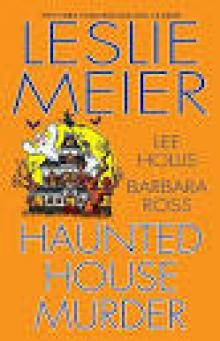 Haunted House Murder
Haunted House Murder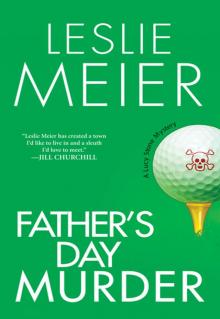 Father’s Day Murder
Father’s Day Murder Chocolate Covered Murder
Chocolate Covered Murder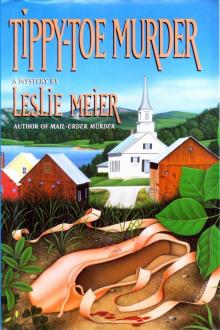 Tippy Toe Murder
Tippy Toe Murder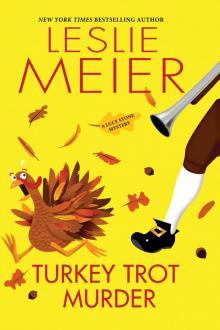 Turkey Trot Murder
Turkey Trot Murder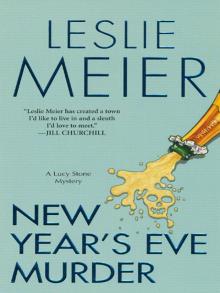 New Year's Eve Murder
New Year's Eve Murder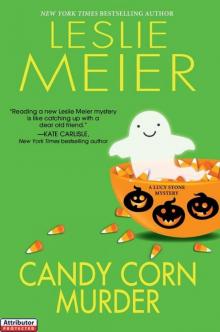 Candy Corn Murder
Candy Corn Murder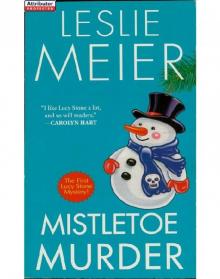 Mistletoe Murder
Mistletoe Murder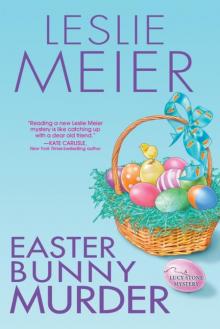 LStone 20 - Easter Bunny Murder
LStone 20 - Easter Bunny Murder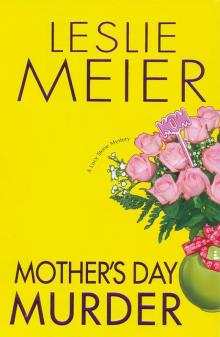 Mother's Day Murder
Mother's Day Murder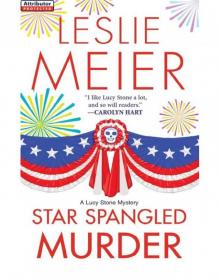 Star Spangled Murder
Star Spangled Murder Silver Anniversary Murder
Silver Anniversary Murder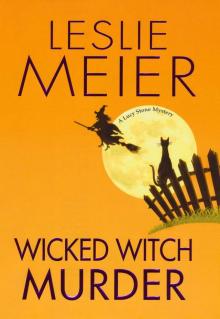 Wicked Witch Murder
Wicked Witch Murder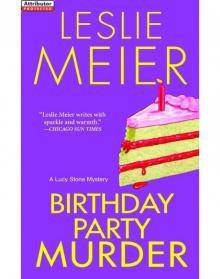 Birthday Party Murder
Birthday Party Murder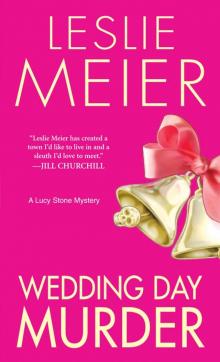 Wedding Day Murder
Wedding Day Murder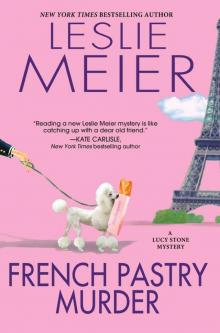 French Pastry Murder
French Pastry Murder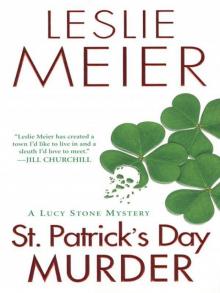 St. Patrick's Day Murder
St. Patrick's Day Murder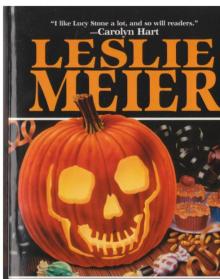 Trick or Treat Murder
Trick or Treat Murder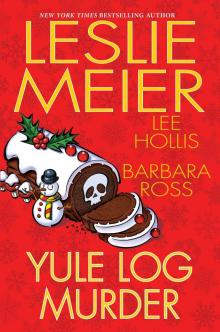 Yule Log Murder
Yule Log Murder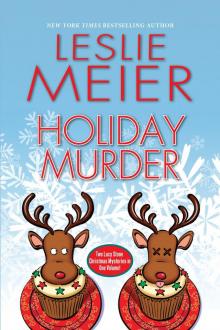 Holiday Murder
Holiday Murder British Manor Murder
British Manor Murder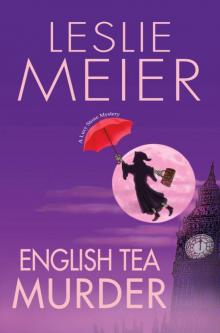 English Tea Murder
English Tea Murder